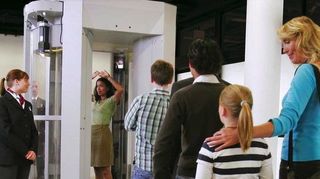TSA to remove 'naked body scanners' from airports
X-ray machines to be gone by June

Flying the friendly skies is about to get a little less frisky, as the Transportation Safety Administration announced that it's doing away with those revealing backscatter machines.
The TSA said that it has ended its contract with Rapiscan, the maker of the much maligned low-dose X-ray technology, which privacy advocates have deemed "virtual strip searches."
The federal agency was as clear about the reason for the change as the soon-to-be-axed X-ray images: Rapiscan was unable to write software to make the machine less revealing before the summer travel season.
"Due to its inability to deploy non-imaging Automated Target Recognition (ATR) software by the Congressionally-mandated June 2013 deadline, TSA has terminated its contract with Rapiscan," the TSA said in a press release.
Making room for millimeter-wave technology
The TSA has already removed 76 backscatter X-ray machines from U.S. airports in 2012, leaving 174 Rapiscan machines, according to Bloomberg.
Instead of these "naked body scanners," the agency will continue to introduce millimeter-wave technology machines manufactured by L-3 Communications Holdings.
These new "whole body scanners" are much less intrusive and already in place in airports around the country.
Get daily insight, inspiration and deals in your inbox
Get the hottest deals available in your inbox plus news, reviews, opinion, analysis and more from the TechRadar team.
Additionally, the millimeter-wave machines are faster than the backscatter machines and use radio frequencies for detection of contraband, not low-dose X-rays.
"By June 2013 travelers will only see machines which have ATR that allow for faster throughput," promised the TSA.
"This means faster lanes for the traveler and enhanced security. As always, use of this technology is optional."
Via Bloomberg

